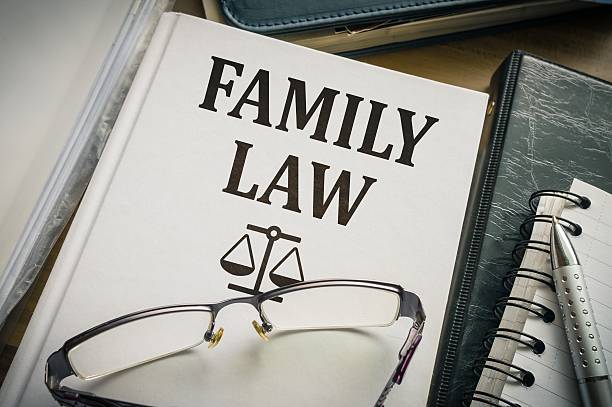
Family Law – Resolving Conflict With CalmGoing through a divorce or a paternity case is a difficult process. Whether you are dividing assets or trying to figure out custody issues for your children, emotions are bound to run high. Phrases like “marital” and “non-marital” or “joint legal” and “sole legal” may cause your head to swim. It is in your best interests to seek legal counsel as early as possible to help you through the process. If you have been served with paperwork you have a limited amount of time to respond to the paperwork or else the other side may with what is known as a default judgment. Our office handles contested and non-contested divorces, petitions for declaration of paternity and non-paternity; cases where one party is seeking to modify awards of child custody and/or child support or maintenance; cases to enforce child support and maintenance payments, and motions to modify any of the above. We also handle appeals both administratively and to the Appellate Court. We will stand beside you through the entire process from filing to either trial or settlement. Divorce – Divorces include not just the dissolving of a marriage but may also involve the division of marital property and debts, maintenance (formerly known as alimony), child custody, and, child support. Dissolution cases can be quite complex but most importantly, they can be quite emotional. You need an attorney who will help you navigate the case. Depending upon the circumstances, you may have to go to court for your divorce if there are any disputes or, if both parties are in complete agreement, then the court could grant the divorce based upon submission of affidavits. Declaration of paternity and non-paternity – Declaration of paternity involve cases of children born to two parents who are not married or children born outside of a marriage. In some situations, you may need to file a paternity action concurrently with your divorce if your child was born outside of the marriage (i.e. before you and your spouse married or, in some cases, after you and your spouse were divorced.) Third-Party Custody – In some cases, a third-party such as grandparents, step-parents, other family members or persons who have may come in an file for third-party custody. The person may be filing because the parent(s) are unsuitable or unable to perform the role of parent. The third-party files for custody and, if they prevail then they are awarded sole legal and sole physical custody. There have been some judgments where parents share custody with a third-party but usually that happens when the parties have reached a settlement, otherwise the third-party, if the parent(s) are found to be unfit, unsuitable or unable and it is in the best interests of the child for the third-party, will be awarded sole legal and sole physical custody. In most, but not all cases, the parents are awarded visitation through a parenting plan. Grandparent visitation – Under Missouri law, grandparents have a right to either intervene in a divorce case or, in certain situations, to file a petition for grandparent visitation. Back in the day, the threshold was that a grandparent had to have been denied visitation for a period of 90 days after which the grandparent could then file. In 2019, the visitation time frame was shortened to 60 days. And, based upon Missouri caselaw, it is no longer a requirement that a grandparent be denied visitation for 60 days before filing. Now, a grandparent can file their petition days or weeks after a visit and if they are denied visitation inside of the court and before the entry of an order for visitation then the grandparent will prevail. This is risky because if the parent’s attorney is aware that any 60 day time period, including inside the case, will result in a win for the grandparent then the attorney will advise their client to offer visitation throughout the case on a timely basis. Many grandparents, especially in cases, where the parent (their child) is deceased will file a proposed parenting plan that sets out frequent visitation much like what a living parent would get in a divorce or paternity case. However, while the statute states that the grandparent may be awarded “reasonable” visitation, caselaw states that the visitation shall not be in a such a frequent manner as to interfere with a parent’s right to custody. Child Custody (all cases) – In cases involving child custody, a parent is awarded sole and/or joint legal and sole and/or joint physical custody of a child. The courts have the power to grant any combination of custody depending upon what is in the best interests of the child. Custody determinations in Missouri must be based on the welfare and best interest of the minor child. In cases where abuse and/or neglect has been alleged, an attorney called a Guardian ad Litem is appointed to represent the child. It is the Guardian ad Litem’s job to act as the eyes and ears of the Court and to make recommendations regarding the best interests of the minor child. The judge has the ultimate decision-making authority as to an appropriate award of custody. Child Support – Under Missouri law, parents owe a duty of support to their children. Child support can be set administratively by the Family Support Division or by a Court in divorces, paternity cases, and, modifications. In some instances, one parent files for child support administratively with the Family Support Division or through the filing of a divorce or a paternity action In other instances, one parent applies for benefits such as TANF and the state goes after the other parent for support to recoup some of the benefits In every case, child support is calculated according to Missouri Supreme Court Rule 88.01 pursuant to a Form 14 worksheet. The amount that is calculated is generally the amount awarded unless the parties agree otherwise or the Court determines the amount to be unjust or inappropriate given the circumstances of the parties. Modifications – Parents have the ability to modify maintenance, child support, and, child custody awards. You may hear attorneys use the phrase “substantial and continuing change of circumstances” in connection with modifications in general but it is important to know that the standard to modify child support is different than the standard necessary to modify child custody and visitation. The failure to know the appropriate standard could lead to the dismissal of your case so it is important to choose an attorney who is familiar with modifications and which standard applies to which portion of your case. Parenting Plan – A parenting plan is a document which provides a baseline for visitation and custody. A parenting plan can be drafted based upon an agreement of the parties or can be written up by the Court after a contested hearing. The document lays out, among other things, how visitation, custody, child support, and, decisions regarding the child’s health and education are to be handled. In the healthiest of parenting partnerships, once the parenting plan has been entered by the Court, the parents essentially throw away the parenting plan and work together with regards to visitation. However, in the event that the parents cannot agree then the parenting plan is the document that they use to figure out visitation, child support, provision of insurance, etc. |
